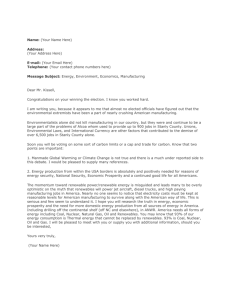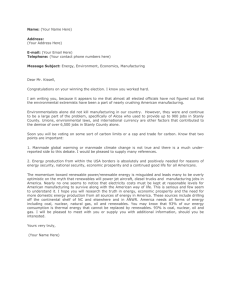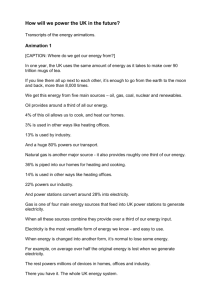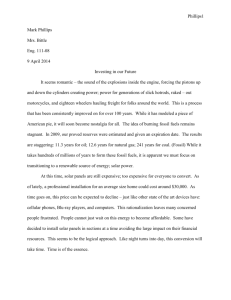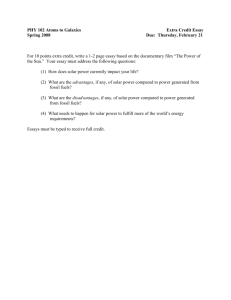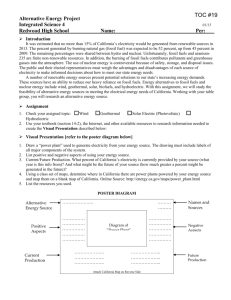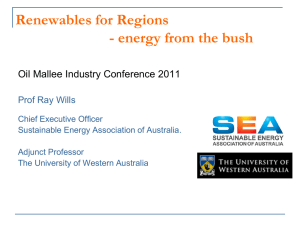Interview - Program for the Human Environment
advertisement
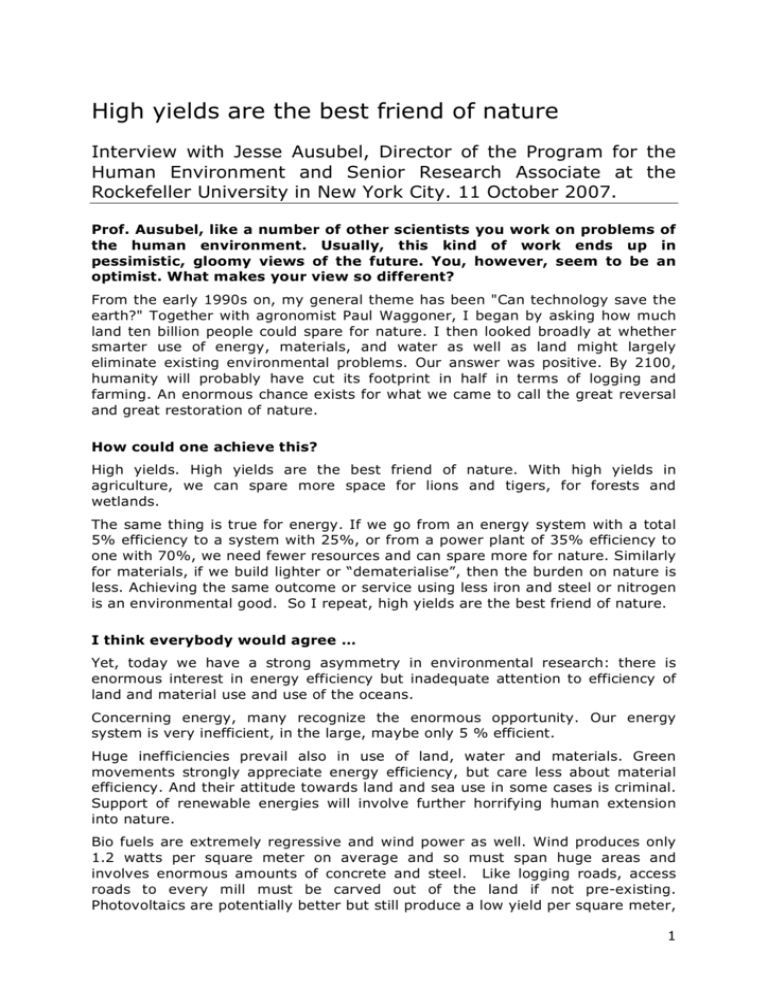
High yields are the best friend of nature Interview with Jesse Ausubel, Director of the Program for the Human Environment and Senior Research Associate at the Rockefeller University in New York City. 11 October 2007. Prof. Ausubel, like a number of other scientists you work on problems of the human environment. Usually, this kind of work ends up in pessimistic, gloomy views of the future. You, however, seem to be an optimist. What makes your view so different? From the early 1990s on, my general theme has been "Can technology save the earth?" Together with agronomist Paul Waggoner, I began by asking how much land ten billion people could spare for nature. I then looked broadly at whether smarter use of energy, materials, and water as well as land might largely eliminate existing environmental problems. Our answer was positive. By 2100, humanity will probably have cut its footprint in half in terms of logging and farming. An enormous chance exists for what we came to call the great reversal and great restoration of nature. How could one achieve this? High yields. High yields are the best friend of nature. With high yields in agriculture, we can spare more space for lions and tigers, for forests and wetlands. The same thing is true for energy. If we go from an energy system with a total 5% efficiency to a system with 25%, or from a power plant of 35% efficiency to one with 70%, we need fewer resources and can spare more for nature. Similarly for materials, if we build lighter or “dematerialise”, then the burden on nature is less. Achieving the same outcome or service using less iron and steel or nitrogen is an environmental good. So I repeat, high yields are the best friend of nature. I think everybody would agree … Yet, today we have a strong asymmetry in environmental research: there is enormous interest in energy efficiency but inadequate attention to efficiency of land and material use and use of the oceans. Concerning energy, many recognize the enormous opportunity. Our energy system is very inefficient, in the large, maybe only 5 % efficient. Huge inefficiencies prevail also in use of land, water and materials. Green movements strongly appreciate energy efficiency, but care less about material efficiency. And their attitude towards land and sea use in some cases is criminal. Support of renewable energies will involve further horrifying human extension into nature. Bio fuels are extremely regressive and wind power as well. Wind produces only 1.2 watts per square meter on average and so must span huge areas and involves enormous amounts of concrete and steel. Like logging roads, access roads to every mill must be carved out of the land if not pre-existing. Photovoltaics are potentially better but still produce a low yield per square meter, 1 at present only 6 or 7 watt per square. To power a city, renewable systems require thousands or tens of thousands of times as much land as natural gas turbines or nuclear power plants. You are paying a lot of attention to land use. I denominate environmental goodness for the most part in square meters or densities. In the food system, I take an interest in farmers with high yields and little fallout, whether they use genetically modified organisms or intensive labor. Japanese and Chinese have achieved high yields largely through high labor inputs in each square meter. If people are willing to do farm work and achieve high yields, the outcome is fine with me. If a society can do it with technology in lieu of labor that is also fine. Strategies that reduce yields, as do some forms of organic farming, are fundamentally bad from the point of nature. Organic farming directed at high yields is fine. But if it means reverting to low yields it is a terrible mistake in a world of 6,4 billion people, growing, we do not know how high, to maybe 10 or 20 billion people. Low yields require cutting more nature to serve human wants. More people with a higher standard of living means higher demands for food products. Therefore, the main strategies we introduce must be scalable to serve a large market, not a solution only for a small cult. Considering your care about nature, one would assume that you are part of the green camp. However, you seem to discard many of the popular green ideas. Many conventional green ideas are antique, ideas that operate usefully at the scale of a rural family. But to provide pork or spinach for one billion Chinese, then you must ask how humanity can average very high yields. In the energy system, including power plants, improved efficiency can also spare more for nature. Natural gas is better than oil or coal, because every kilogram of gas has more joules and less carbon in it. High densities in consumption, namely cities where the majority of humanity now lives, finally drive the system, and over time the best way to meet the high densities of consumption is through high densities in production. In this regard, nuclear power has tremendous attractions from the point of view of land and material use. People are sometimes surprised at my interests in magnetically levitated trains and zero emission power plants and also forestry and fishing – I see the subjects coherently. I want a large prosperous society that emits little or nothing harmful and spares large amounts of land and sea for nature. I agree that nature can only be preserved to a considerable extent if human activity is based on high technology. Germany at present has taken the opposite way: nuclear plants are supposed to shut down, wind mills are popping up everywhere, large areas are being used for bio fuels. Sadly, the destruction of landscape for so-called green energy, not only in Germany, may be fruitless because wind and solar will not provide the needed large amounts of kilowatts. In twenty years, these sources will have failed 2 economically, leaving renewable energy to be remembered as the energy equivalent of sub-prime mortgages. OK, we are rich and can afford to waste money. We do so in all aspects of life. But then society is left with a regrettable material legacy. Renewables mean renewed destruction of the landscape. This is especially sad when we are wealthy enough to make our cities beautiful without devastating the hinterland. Renewable energies were once seen under the headline of "Small is beautiful": some solar collectors on the roof and a wind converter in the backyard were supposed to replace complex and big technology. Now, with the rapid growth of wind power or bio fuels it is becoming more than obvious that this doesn’t function. Wind converters are getting bigger and bigger and need more and more space as does solar and bio fuel farming. Devices can be small but they have to become more efficient and more powerful. Things have to become smaller and more efficient or smaller and more powerful simply because they are multiplied by millions of users. In telecommunication and other information technology devices, small is beautiful because the devices keep getting smaller and more powerful. If all one has to offer is a constant proportionality of watts per square meter from wind mills, then small is not beautiful. Small multiplied by many users turns into a very large sprawling ugly destructive system. Plans in Europe foresee huge wind industry areas in the North and the Mediterranean Sea, in Kazakhstan and Russia, hydro and pump power in Norway and Swiss, and large solar power fields in the Sahara and Sinai, everything connected through an extended super grid. Is this feasible? A super grid with superconducting cables for transporting electricity wrapped around cold pipes transporting hydrogen long distances with minimal loses might make sense, especially underground. The sources you mention don’t match a supergrid. Collecting a kilowatt or two per square meter would require an immense, unjustifiable infrastructure of poles and wires to collect the scattered kilowatts into the 10 gigawatt flow that, for example, New York City consumes. Your mention of hydropower raises an important point that curiously nobody seems to worry about: if climate is changing, then climate-dependent solar, wind, and biomass are the least reliable, most vulnerable forms of energy. If a system depends on Norway and Switzerland having hydropower and the rain fall redistributes itself because climate changes, then no water may accumulate behind the dams if Norway and the Alps dry. Water infrastructure takes a very long time to build and once built stays put, as Roman aqueducts show. A system that will finally rely on water and pumped storage in a rapidly changing climate is very imprudent. Similarly, if Sahara becomes green it will be cloudy, making how many kilowatts a solar system there might generate imponderable. In truth, if investing giga euros to collect energy from today’s climate is risky, then investing them to collect energy from the climate of 2050 predicted by an imperfect model is even riskier. Wind may not blow where societies build the wind mills, sun may not shine where they build solar farms, and rain may not fall behind dams or on biofuel farms. In a greenhouse world, so-called renewables are a formula for instability and insecurity. 3 You also work on a field called industrial ecology. In public opinion, industry and ecology appear to be very different, if not opposite to each other. How do you bring the two together? Natural ecology and industrial ecology share basic ideas of systematic recycling and reuse of material. During four billion years, green ecology developed such systems of recycling as nutrients washing into oceans, plankton and then krill feeding on the nutrients, fish and whales feeding on the krill, and at the bottom, microbes on the ocean floor living on the snow of detritus from the animals above. Industrial ecology shares with natural ecology the basic idea of recycling. In the exuberant development of industry during the past 200 years, industry and human society neglected the lesson of a good biological model and allowed an excessively large and unnecessary category of garbage or waste to build up. On a deep level, industrial ecology is about a systems view of the economy in which, in the first place, less waste is generated and then, the wastes that are generated are more suitable for reuse. Humans spend a lot of time extracting fresh resources from nature. In fact, we have many of these resources already organized and concentrated all around us, especially in cities. Benefiting from some modern techniques, we can recycle better. The basic concept of recycling is right. How can this be improved? Why do most societies recycle little? In many cases “waste” materials are poorly labelled, people do not know where the materials are or even that they exist, and so, miners go and dig more zinc or iron. Beyond the visible environmental costs of pits in the earth and erosion into streams, the costs can include unwanted elements like the cadmium let loose when mining for zinc. Our research group has tried to identify barriers to the efficient use of materials, such as a lack of information. Technology is speeding and economising the flow of information. The internet allows markets where they did not exist before. Consider eBay. People now sell and thus recycle all sorts of objects, formerly too small and inexpensive to repay traveling to market or even a classified ad. Jewels enjoyed a global market but not postcards. Now the internet allows markets to coalesce, creating a global "flohmarkt" for consumer goods. These kinds of markets should be able to flourish much more for other categories of waste or by-products that a modern society creates but does not recycle. Historically everywhere, and still in poorer societies, people search for value in what has been waste to others. All kinds of things are sorted and reused through a second or a third life. The rich societies became indifferent to the value of rubbish and now pay a price. Industrial ecologists would like to see a big reduction in waste and a big rise in recycling, exploiting the opportunity of today’s high-tech information flows. Doesn't this also mean that you have to educate people to be more thoughtful with their resources? I am more optimistic about technological change than I am about behavioural change. Modifying behaviour is very hard. Consider tobacco or the obesity epidemic, which has spread from the US to many other countries. People understand they should not smoke and overeat, and yet, they do. 4 A technological fix is often more efficient, as a seat belt is easier than changing driving behaviour. The idea that we can largely rely on behavorial change to overcome environment challenges is a dream. People can't and won’t all become Buddhist monks, owning only one pair of sandals and eating only a little bit of rice. So, one has to look for clever ways for industries, households and individuals to be cleaner, safer, and more efficient. I applaud behavioural innovation like the reduction in smoking of tobacco in a growing list of countries, but I would not rely solely on it. People from the Wuppertal-Institut tend to conclude from their work that man would be "overusing" earth. If everybody in the world would live like people in the advanced countries, one would need two or three earths. Would you agree with this conclusion? The assumptions determine the conclusions. If one assumes twofold more people and a threefold increase in GDP per capita and that these richer, more numerous people would drive the same cars as today, then the demand and side-effects would be huge. Present problems from an environmental point of view would be six times today. However, if one symmetrically assumes an increase in efficiency through maglev trains, LED lighting, or clever genetics and some levelling of demand for food and energy as people grow richer, then the challenges look manageable. Wood products offer an interesting case. Demand for tons of most wood products, including pulp and paper, is falling in rich countries as consumers replace newspapers with electronic devices and suppliers offer more efficiently designed products. The rest of the world will not live like America. That is, future economies, including the economy of the USA, will enjoy the benefits of learning how to provide goods and services with higher yields and less fallout. The climate issue plays an extraordinary role in the public debate in Germany and it especially serves the purpose of pushing renewable energy. Do you think it is a logic conclusion to say: We have climate change, so we need renewable energy? Three principal means reduce emissions of greenhouse gases into the atmosphere. One, already discussed, is efficiency. The second is increased use of natural gas (methane) with carbon capture and sequestration in the very large (five gigawatt) zero emission power plants that our group has described in some detail. These plants could double the efficiency of today’s electric power plants Crucially, it is much easier to collect what emissions exist from a few very large plants than from many smaller ones. The third means is nuclear power. Nuclear plants can produce the needed gigawatts and the needed hydrogen which will allow humanity to reduce use of oil, a source of about a third of today’s carbon emissions. Efficiency, natural gas and nuclear constitute the winning way to address the climate issue. The renewables will fail. I hope not too much money is spent on them, and I hope they don’t do too much environmental damage by the further rape of landscape by biofuels, wind mills and solar farms. Although I hope that people come to their senses sooner rather than later, history shows popular delusion is eternal, whether in the Tulipmania of the 1630s or the Dot.com boom of the 1990s. 5 What about measures that help adapting to a possible climate change? The way to adapt is not by making society more vulnerable to climate as wind and water mills, photovoltaics and bio fuels do but to look for ways to further insulate society from climate, should it change. The most obvious way is further improving weather forecasts. The climate of future decades eventually becomes the weather of next week. Weather forecasts are now good for three to five days, and top experts think they could be good up to seven or even ten days. In any society, seven days offer a lot of warning. Warned that severe storms or floods are on the way, large numbers of people can protect buildings and shuffle from one place to another. Other forms of adaptation apply particularly in regard to water. If societies could double their water use efficiency, whether in Germany or Uruguay, they would be less vulnerable to climate change and variability. There are obvious good things to do to adapt to whatever climate may come. Why should climate change necessarily be bad? For humans warming and drying, for example, are not necessarily bad. In practice, the internal migration in the US, Canada, or France shows people are moving south to where the climate is drier and warmer. The fastest growing cities in the US are Phoenix and Las Vegas, cities considered harsh and barely habitable until air conditioning came along. Look also at the seasonable behaviour of people in Northern Europe. In winter they travel to Tunisia or the Canary Islands or the Red Sea. So, humans are voting for warming whether or not Earth’s climate changes. The economic booms in countries such as China or Thailand are also very closely tied to air conditioning. People are living in good health and thriving economically in climates long considered unattractive and economically doomed. For green nature rapid climate change is probably a rough story. If rainfall and temperature change, the distribution of plants and animals shifts, and not by the choice of buying an airplane ticket or a 2 nd home as for humans. Few if any other forms of life have the choices humans enjoy, in part because humans have changed the landscape already so much to their own advantage. The caution about climate change should not come from worry that the human standard of living will drop. The Stern report about loss of GDP misses the point. My concern is that what nature humans have not yet pressured could come under pressure. Present ecosystems would be displaced by ones adapted to the new climate. If rain begins to fall in the Sahara, beautiful new ecosystems could emerge, but I prefer not to roll the dice. My conservatism, not politically but in the sense of environmental conservation, comes not from unconvincing alarmist worries that some humans will lose wages or contract malaria. Rather, I am a habitat-oriented green. We still have beautiful and large forests in northern New York State, but if the climate becomes much drier, maples could be displaced and fall colors be dimmer. Let’s give non-human nature a chance. You say that renewables are not green … Renewables are not green, and bio fuels are criminal. We should be farming less area, we should be logging less forest, and we should be trawling less ocean. We know what using bio fuels for the energy economy involves, in Europe above all, 6 where humans employed millions of horses and draught animals for many centuries. Farmers had to grow a lot of hay and maintain pastures to power horses. Between a quarter and a third of farmland biofueled horses and oxen. Europeans cleared forests for the biofuel of firewood. Each driver would need a pasture of several hectares for each BMW – at a time when we could be celebrating the possibility of allowing agricultural land to revert to wilderness or other mild uses. Using switch-grass instead of corn or soy beans means mining of the soil. A farmer who grows corn for food and ploughs under the corn stalk leaves some organic matter. If the biofuel industry removes every gram of the plant as the advocates of switch-grass aim to do, and send the biomass to refineries, then in ten or twenty years a lot of what makes the soil fertile will have been carted away and need replenishment by fertilizer. The “new” bio fuels are just mining the soil in a manner that farmers hundreds and thousands of years ago learned to reject. On the scale of the needed gigawatts, as especially China, India, and other populous societies require, each renewable form of energy, whether biomass, wind or solar or hydro, wave or tidal power, destroys nature. These considerations seem obvious. Can you explain why politicians are not considering these ideas? Recent reports by the US National Academy of Sciences elaborate on environmental problems of bio fuels. In late August, one addressed the killing of birds and bats by windmills. In October, another addressed the depletion of aquifers to grow and distil ethanol. The analytic community is starting to bring the fallout from renewables more to public attention. But humans are not rational. Why do people buy lottery tickets? They hope for a solution, effectively by magic, as lottery jackpot odds are one in millions. Much of the enthusiasm for renewables is belief in magic. People tire of hearing about problems related to fossil fuels or nuclear power, presented in great detail for 30 years. Anything different sounds better. Humans want to believe. In a profound short story called the Kugelmass Episode by the American humorist Woody Allen, the dissatisfied hero rejects the psychoanalyst who has been trying to adjust Kugelmass to reality and chooses to patronize a magician instead, who works the miracle of transporting Kugelmass into the novel Madame Bovary, with whom Kugelmass then has an affair. Kugelmass, biomass. But one should expect more rational behaviour from politicians who decide about the large sums of taxpayers’ money to be invested in renewables?’ Most political behaviour is symbolic or ceremonial and the will to power is independent of ideology. So, most politicians do what they think will maintain their own positions of power. If promoting renewables is popular, politicians will promote that platform until it finally becomes untenable. Like other humans, politicians are not rational. However, parts of the economic system in the large may be rational. Similarly, firms are not rational. Look at restaurants. Only very few people would start a restaurant if they reckoned the chances of success. Most restaurants fail. But the myopia of society and its irrationality are often a great advantage because it allows the system to 7 experiment and explore. Finally, I have confidence humanity will resume a smart path to decarbonization through efficiency, methane, and nuclear energy. In the interim renewables may exact a price. Earth will be left with more shaved land, more pavement, and rotting, rusting structures of concrete and steel. Many people in Germany and other developed countries care deeply about biodiversity in South America, about roads in the Amazon or large dams in China. I hope they connect their appreciation of the distant threats to nature with the threats to nature in their own countries. Germans may see Brazil more clearly than Bavaria, whose landscape they seem eager to industrialize further. I recur to the fundamental point. High yields are the best friend of nature. If humanity wants to leave the Amazon little disturbed, they need farming and forestry and energy in Brazil that does not encroach on nature. They must open their eyes to the high price of low yields in Brazil. The same basic truths about densities hold in Germany. If Germans want some restoration of the forests that once covered 90% of their land, or of their wetlands, they should not plow fields for biofuels or spread windmills in the Waddensee. If humans carefully produce very high yields of food or wood or energy in very small areas, they can spare most of Nature. 8
